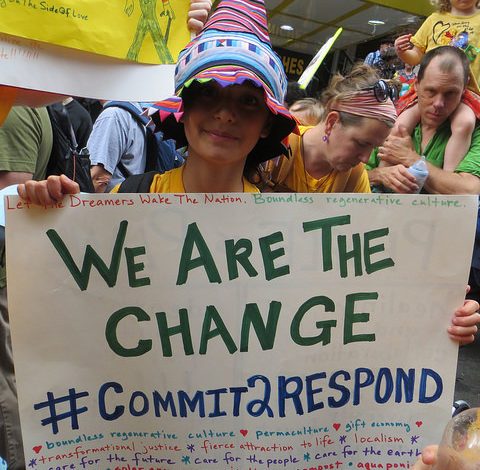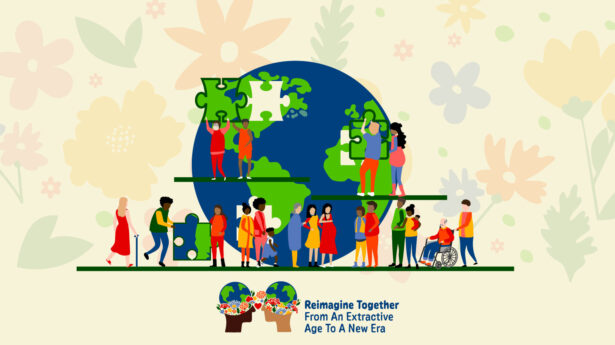The Unitarian Universalist Service Committee advances human rights through grassroots collaborations.
In Their Own Words: A Pressing Moral Issue

February 3, 2015
An Interview with Pamela Sparr on Climate Change
People are talking more about the dangers of climate change than ever before. UUSC recently teamed up with the Unitarian Universalist Association and other UU organizations to help people band together and do something about it. Pamela Sparr, UUSC’s associate director of advocacy, activism, and engagement, talks about Commit2Respond, this new initiative to advance climate justice.
Why should people care about climate change?
Climate change is one of the most pressing moral issues of our day. It exacerbates existing inequalities among people and nations. It threatens the very survival of entire cultures and communities. And it poses a moral challenge that has a depth and scale we haven’t really faced in this lifetime.
At the same time, climate change also offers us new opportunities to build the kind of Beloved Community we all yearn for. This issue touches every human being and every life form — now and for all the generations to come. It really pulls on all the strands of the intricate web that we all are a part of. Climate change invites us to think holistically and weave interconnected responses to it.
What do we — as a country and as a planet — currently face with climate change? How do you see that evolving?
First, there are changing environmental conditions — sea levels are rising; storms are more frequent and severe; rainfall is unpredictable, causing drought and flooding. In turn, people’s livelihoods and traditional ways of life are threatened, whether it’s Masaii people in Kenya being forced to herd camels instead of cattle or fishing and tourism in the Caribbean being affected by bleaching of coral reefs.
Second, climate change will contribute to heightened security risks. The Pentagon and Department of Defense have been worried about this for some time. Third, there are health risks, like the spread of certain insect-borne diseases as the insect range changes. And then there are profound psychological and spiritual consequences. Our experience of place is being jeopardized, which is particularly challenging for people whose religious and spiritual traditions are linked to the natural world.
One thing to note is that things are likely to get worse before they get better. When you consider that greenhouse gases, which have contributed to global climate change, have half-lives like radioactive elements, you understand that our past actions have long-lasting impact.
How is climate change a human rights issue?
It’s a human rights issue and a justice issue many times over. For one thing, the people bearing the biggest burden of the negative consequences are not the people who have caused the problem. The folks who benefited from an economy based on fossil fuels are not the ones paying the price. And the consequences of climate change threaten a whole host of human rights: rights to water, livelihoods, cultural integrity — those are just a few. And it’s a huge racial justice issue on a global scale, because communities of color are most affected.
It’s important to note the domino effects, too. For example, climate change is causing erratic rain patterns and drought in Africa, and drought means longer journeys to collect water. Girls, who in many rural communities are traditionally expected to gather water, often must forego their education — which they have a human right to — to undertake these prolonged journeys. Not to mention the increased risk of violence they face.
What does “climate justice” mean?
To me, climate justice means several things: that the people who caused the problem take the responsibility for fixing it; that we take aggressive action now so that we avoid a “tipping point” if at all possible; and, that that we address other forms of discrimination and oppression as we craft solutions.
It’s also really important to recognize that it’s not all doom and gloom. We’re at a moment where we can create solutions that address not only climate but also all these other longstanding inequalities and oppressions. Commit2Respond invites all of us to be part of solutions that will actually move us forward on many fronts at once. That’s what is really exciting and new about this effort.
What exactly is Commit2Respond?
Commit2Respond is an ambitious initiative that asks us to do three things: shift our consumption to lower our carbon footprint and promote renewable energy, grow the climate justice movement, and advance the rights of peoples affected by climate change. It invites us — as individuals, as members of a family or household, part of a congregation or community group — to collaborate with others to make greater impact.
Commit2Respond is going to help us be more conscious, creative, and strategic about changing policies, transforming our economy, and creating a more sustainable future for everyone. We have a terrific leadership team that brings tremendous expertise on this issue and related concerns.
Some people feel overwhelmed or confused by climate change. What would you say to them?
It is very understandable how someone can feel overwhelmed. To successfully address climate change, we have to reshape our economy — no small task! — and do it fairly quickly. Sometimes it is hard to know where to begin. But with Commit2Respond, we’re coming up with some important basic steps that everyone can take.
Plus, when you become part of Commit2Respond, you are not alone — you’re part of a community! We will have links to resources and coaches who can help you untangle conflicting information, clarify options, talk you through key decisions, etc. And it doesn’t matter if you’re new to climate justice or a veteran of the movement.
We have a fairly narrow window to get our act together, but it’s not too late. And to the extent that can make a tremendous difference in people’s lives, we have a moral obligation to do that. This requires a political and social and emotional and moral fix.
How do people get involved with Commit2Respond?
Start by signing up at commit2respond.org! Information is being added to the website on a continuous basis. The official commitment period begins on March 22, World Water Day. There will be information about a variety of actions, including holding a Climate Justice Sunday worship service. But first things first: sign up — then we’ll keep you in loop!

